The Year of Reading Proust discussion

This topic is about
The Captive / The Fugitive
The Fugitive, vol. 6
>
Through Sunday, 3 Nov.: The Fugitive
 Last comment promised (for now! lol): a beautiful bit of writing where the Narrator starts thinking of Balbec as a "décor de théâtre" (eng?):
Last comment promised (for now! lol): a beautiful bit of writing where the Narrator starts thinking of Balbec as a "décor de théâtre" (eng?):Ah! quelle souffrance s'il me fallait jamais coucher à nouveau dans ce lit de Balbec, autour du cadre de cuivre duquel, comme autour d'un pivot immuable, d'une barre fixe, s'était déplacée, avait évolué ma vie, appuyant successivement à lui de gaies conversations avec ma grand'mère, l'horreur de sa mort, les douces caresses d'Albertine, la découverte de son vice, et maintenant une vie nouvelle où, apercevant les bibliothèques vitrées où se reflétait la mer, je savais qu'Albertine n'entrerait jamais plus! N'était-il pas, cet hôtel de Balbec, comme cet unique décor de maison des théâtres de province, où l'on joue depuis des années les pièces les plus différentes, qui a servi pour une comédie, pour une première tragédie, pour une deuxième, pour une pièce purement poétique, cet hôtel qui remontait déjà assez loin dans mon passé? Le fait que cette seule partie restât toujours la même, ses murs, ses bibliothèques, sa glace, au cours de nouvelles époques de ma vie, me faisait mieux sentir que, dans le total, c'était le reste, c'était moi-même qui avais changé, et me donnait ainsi cette impression que les mystères de la vie, de l'amour, de la mort, auxquels les enfants croient dans leur optimisme ne pas participer, ne sont pas des parties réservées, mais qu'on s'aperçoit avec une douloureuse fierté qu'ils ont fait corps au cours des années avec notre propre vie." p203
Beautiful.
I'm fascinated by the way Proust makes his sentences dynamic, creates a movement in us that is breathless.
 A picture to apologise for all these intempestive posts. :)
A picture to apologise for all these intempestive posts. :)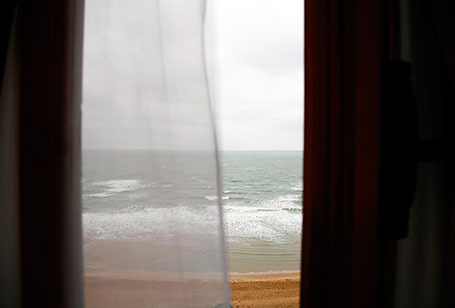
Vue de la chambre où séjournait Marcel Proust, au Grand Hôtel de Cabourg / View from Proust's room in the Grand Hôtel in Cabourg
Source: http://www.telerama.fr/radio/proust-r...
(Marcelita if you want to pin the Telerama article: it's about the radio series "Un été avec Proust" which ran on France Inter this summer and which I linked in the francophone thread)
 Well I lied. Here's another comment from me. :p
Well I lied. Here's another comment from me. :pTo those who visited Cabourg this summer, were you able to visit Proust's room? It was occupied when I was there so we couldn't look at it. This is supposed to be Proust's room:
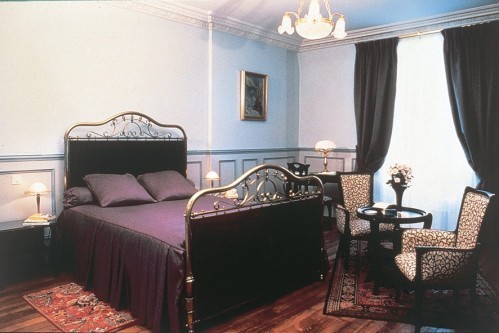
Source (with other pics from inside the Grand-Hôtel):
http://www.marclefrancois.net/article...
 Another quotable Proust:
Another quotable Proust:C'est le malheur des êtres de n'être pour nous que des planches de collection fort usables dans notre pensée
Loved the Versailles collection - I see Proust in my minds eye like a hazy figure in the background of those Versailles fountain images, committing them to memory for future use just as I'm commiting him to memory for future retrospection. And forwards and backwards we go...
 Book Portrait wrote: "Last comment promised (for now! lol): a beautiful bit of writing where the Narrator starts thinking of Balbec as a "décor de théâtre" (eng?):.."
Book Portrait wrote: "Last comment promised (for now! lol): a beautiful bit of writing where the Narrator starts thinking of Balbec as a "décor de théâtre" (eng?):.."That is how I imagined Balbec while reading the second part of À l'ombre de jeunes filles en fleurs and I wrote a review around that very idea:
https://www.goodreads.com/review/show...
 More quotable Proust (this could become a game! lol):
More quotable Proust (this could become a game! lol):"Notre «moi» est fait de la superposition de nos états successifs."
which continues:
"Mais cette superposition n'est pas immuable comme la stratification d'une montagne. Perpétuellement des soulèvements font affleurer à la surface des couches anciennes. p205
Such a powerful image of the self.
Another lovely bit:
"A partir d'un certain âge nos souvenirs sont tellement entre-croisés les uns avec les autres que la chose à laquelle on pense, le livre qu'on lit n'a presque plus d'importance. On a mis de soi-même partout, tout est fécond, tout est dangereux, et on peut faire d'aussi précieuses découvertes que dans les Pensées de Pascal dans une réclame pour un savon." p204
In a way this feels sad if there is nothing left to discover as we grow older. Then again he says "everything is fecund, everything is dangerous and we make equally precious discoveries in..." so it's not sad from his perspective. It seems he just means the value of things lie inside us. This sentence is fascinating.
 Did we ever get a physical description of the Narrator? I think he gives us clues here and there, right? Here is another one:
Did we ever get a physical description of the Narrator? I think he gives us clues here and there, right? Here is another one:"A ce moment je m'aperçus dans la glace; je fus frappé d'une certaine ressemblance entre moi et Andrée. Si je n'avais pas cessé depuis longtemps de me raser et que je n'eusse eu, qu'une ombre de moustache, cette ressemblance eût été presque complète." p209
And a few paragraphs before he described Andrée:
"Pour la première fois elle me semblait belle, je me disais que ces cheveux presque crépus, ces yeux sombres et cernés, c'était sans doute ce qu'Albertine avait tant aimé, la matérialisation devant moi de ce qu'elle portait dans sa rêverie amoureuse, de ce qu'elle voyait par les regards anticipateurs du désir le jour où elle avait voulu si précipitamment revenir de Balbec." p207
Which is rather like Proust himself of course.
I love how the above continues (makes me think of Baudelaire again):
Comme une sombre fleur inconnue qui m'était par delà le tombeau rapportée des profondeurs d'un être où je n'avais pas su la découvrir, il me semblait, exhumation inespérée d'une relique inestimable, voir devant moi le désir incarné d'Albertine qu'Andrée était pour moi, comme Vénus était le désir de Jupiter.
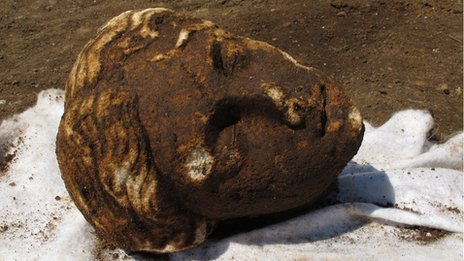
Source: BBC and The History Blog
 Fionnuala wrote: "That is how I imagined Balbec while reading the second part of À l'ombre de jeunes filles en fleurs and I wrote a review around that very idea..."
Fionnuala wrote: "That is how I imagined Balbec while reading the second part of À l'ombre de jeunes filles en fleurs and I wrote a review around that very idea..."Very nice review! Yes the Narrator is a keen observer in the typical manner someone shy and/or introvert is. These of course make the best writers. :) Fascinating to me that Proust was also a brilliant participant in salons.
 Another cultural & historical reference:
Another cultural & historical reference:"Ainsi mon amour finissant semblait rendre possible pour moi de nouvelles amours, et Albertine, comme ces femmes longtemps aimées pour elles-mêmes qui plus tard, sentant le goût de leur amant s'affaiblir, conservent leur pouvoir en se contentant du rôle d'entremetteuses, parait pour moi, comme la Pompadour pour Louis XV, de nouvelles fillettes."
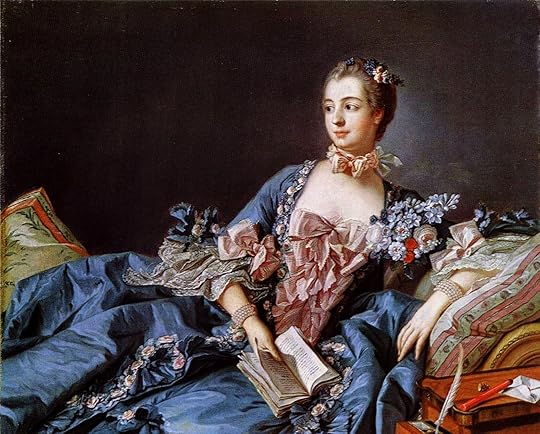
Madame de Pompadour
The king’s favourite and patroness of the arts (1721-1764)
Madame de Pompadour, mistress, friend and adviser to Louis XV, remained with the king up to her death in 1764. Introduced to the court through relatives, she was noticed by the king and quickly became one of his preferred mistresses. Louis XV had the Petit Trianon palace built for her, a haven of peace away from the court.
http://en.chateauversailles.fr/histor...
http://fr.wikipedia.org/wiki/Madame_d...
 The Narrator muses over the type of women he likes since Albertine died and concludes:
The Narrator muses over the type of women he likes since Albertine died and concludes:"De sorte que la ressemblance avec Albertine, de la femme que j'avais choisie, la ressemblance même, si j'arrivais à l'obtenir, de sa tendresse avec celle d'Albertine, ne me faisaient que mieux sentir l'absence de ce que j'avais, sans le savoir, cherché, de ce qui était indispensable pour que renaquît mon bonheur, c'est-à-dire Albertine elle-même, le temps que nous avions vécu ensemble, le passé à la recherche duquel j'étais sans le savoir." p216
"... Albertine herself, the time we had lived together, the past I was in search of without knowing it." This feels like another step towards the Narrator figuring out his (literary) project.
The paragraph continues (too beautiful not to paste here! sorry!):
"Certes, par les jours clairs, Paris m'apparaissait innombrablement fleuri de toutes les fillettes, non que je désirais, mais qui plongeaient leurs racines dans l'obscurité du désir et des soirées inconnues d'Albertine."
 I find it difficult to read some of these passages without thinking of Agostinelli:
I find it difficult to read some of these passages without thinking of Agostinelli:"De combien de plaisirs, de quelle douce vie elle nous a privés, me disais-je, par cette farouche obstination à nier son goût! " p216
"Nier son goût" has been the recurring question the Narrator in his grief tries to answer. Why did Albertine deny she liked women? The Narrator comes to imagine that he could have accepted it and that they would have been happy together...
 Book Portrait wrote: "I find it difficult to read some of these passages without thinking of Agostinelli:
Book Portrait wrote: "I find it difficult to read some of these passages without thinking of Agostinelli:"De combien de plaisirs, de quelle douce vie elle nous a privés, me disais-je, par cette farouche obstination à ..."
Yes, me too and I find myself asking ridiculous questions like, was it Agistinelli's goût for women or in fact for other men which bothered Proust the most. After all, Agostinelli was married for part of the time that he worked as Proust's chauffeur so he hardly kept his goût for women a secret..
I had already underlined several of the passages you've quoted here as I read - the amount of ponderable and satisfyingly phrased passages is a big factor in my enjoyment of Proust - I'm reading Thomas Mann at the moment and I've noticed that I'm not nearly so inclined to underline The Magic Mountain. Which brings me to mountains. Your quote #59 from page 205 about the geological layers reminded me of Cézanne again and the parallels between his work and Proust's. When he painted his Mont Saint Victoire series, it was as if he was trying to analyse the geometry in space and time of that particular mountain which he did not believe was immutable but in flux so that every time he painted it, it was a different mountain in a similar way to the way the Narrator views our psyhchological state:
Notre 'moi' est fait de la superposition de nos états successifs.
Thanks for the positive comment on the review. Yes, it is difficult to reconcile the very social Proust with the Narrator as he appeared in the first and second volumes, longing to be in society, to be invited into the Guermantes' extended world but only getting to hover on the edge of Odette's less prestigious circle.
 Kalliope wrote: "Another fascinating section on the identity of the author when he becomes also his own reader...
Kalliope wrote: "Another fascinating section on the identity of the author when he becomes also his own reader......je ne peux pas croire que chaque personnage en ouvrant les yeux ne verra pas directement ces images que je vois, croyant que la pensée de l'auteur est directement perçue par le lecteur, tandis que c'est une autre pensée qui se fabrique dans son esprit...... au moment même où je veux être un lecteur quelconque, mon esprit refait en auteur le travail de ceux qui lisent mon article. p. 230. .."
The Narrator's response to reading his own article as a reader rather than as the author was curious. Is he talking about 'reader participation' here too?
That when we read, we are recreating the text anew, that we all read a different text? And that the text the author wrote is none of those? That is a very post modern idea indeed...
 Great illustrations, Bookportrait.
Great illustrations, Bookportrait.Your comment about memory being written in the body brought to mind the powerful pages when the Narrator returns to Balbec and is suddenly flooded by memories of his grandmother upon bending over to untie his shoes and feeling the tiredness he had felt on his first trip with her.
 Not read it yet but I gather Anna Karenina contains a lot of discussion about Russian farming policy and practises and wonder if the Narrator's obsessions with his emotional geometry are the 20th century equivalent? A pre figuration of a century and continuing of fascination with psychoanalysis?
Not read it yet but I gather Anna Karenina contains a lot of discussion about Russian farming policy and practises and wonder if the Narrator's obsessions with his emotional geometry are the 20th century equivalent? A pre figuration of a century and continuing of fascination with psychoanalysis?
 Fascinated by the glimpse we have of the unshaven Narrator during his meeting with Andree. I feel this mirror view is they clearest we have had of him to date. But, it's a very Proustian reveal - deceptive, a little sly and somewhat mysterious. Could he be saying "this is all smoke and mirrors"? Whatever, someone - Proust, The Narrator - is emerging it seems.
Fascinated by the glimpse we have of the unshaven Narrator during his meeting with Andree. I feel this mirror view is they clearest we have had of him to date. But, it's a very Proustian reveal - deceptive, a little sly and somewhat mysterious. Could he be saying "this is all smoke and mirrors"? Whatever, someone - Proust, The Narrator - is emerging it seems.
 If M. de Guermantes did not understand some sentence which would appeal to Bloch, he might, on the other hand, be amused by some reflexion which Bloch would scorn. ML p. 768
If M. de Guermantes did not understand some sentence which would appeal to Bloch, he might, on the other hand, be amused by some reflexion which Bloch would scorn. ML p. 768Proust, as the recently published Narrator, speaks of competence drawing a difference between interests of two people he knows well. What one can say politely is that M. de Guermantes and Bloch have different impressions of the same text.
The reader of ISOLT assumes the same position that Proust had when he read Ruskin. In articles and prefaces Proust wrote of Ruskin and most importantly, he responded to Ruskin's greatness by making a verbal art that told of his impressions (read opinions) of Ruskin's acuity. Here in this discussion we merely point to Proust in these comments--who has time to do more--we have a different competence than Proust does and consequently have different impressions than he.
A second thing is that there may not be at the end of this novel a satisfaction for us, but we are satisfied by the writing leading up to it, aren't we; it pleases us and why would we want so much more than that. There is a lesson about wanting and having here, I would think.
Third. Is not Albertine's death, the ultimate separation, not unlike the separation caused by jealousy that inspires the Narrator to love her more. He does know that he does loves her dead now, or so he says. Where was she buried by the way? I would love a visit to her grave, grandmother too.
 Fionnuala wrote: "Yes, me too and I find myself asking ridiculous questions like, was it Agistinelli's goût for women or in fact for other men which bothered Proust the most..."
Fionnuala wrote: "Yes, me too and I find myself asking ridiculous questions like, was it Agistinelli's goût for women or in fact for other men which bothered Proust the most..."I don't know enough about Agostinelli. I'm reading Céleste Albaret's Monsieur Proust at the moment and she ridicules the idea that Proust had "other loves" saying that she would have known about it (!). I don't remember enough of Edmund White's Marcel Proust: A Life but my understanding of Proust's love is that it was so exclusive (momma's boy) that I imagine he wanted Agostinelli all for himself, then realising that Agostinelli wouldn't leave Anna, Proust might have negotiated in his mind some dream arrangement but Agostinelli couldn't agree, either because Proust's affection was suffocating and too demanding or because being Italian I imagine he had some strong cultural and internal resistance to homosexuality (but that's terrible stereostyping on my part!). I need to read more about Proust's biography.
{Kalliope is probably shaking her head at us discussing the autiobiographical side of the novel! ^_^}
Proust is highly underlinable. Such beautiful and rich prose but I'm still scratching my head at the "géometrie plane" bit...
I missed the Magic Mountain group read. :( I would have loved to tag along with you all.
 Fionnuala wrote: "quote #59 from page 205 about the geological layers reminded me of Cézanne again and the parallels between his work and Proust's. When he painted his Mont Saint Victoire series, it was as if he was trying to analyse the geometry in spac..."
Fionnuala wrote: "quote #59 from page 205 about the geological layers reminded me of Cézanne again and the parallels between his work and Proust's. When he painted his Mont Saint Victoire series, it was as if he was trying to analyse the geometry in spac..."I'm not familiar enough with Cézanne (I love!Monet. :) Giverny is to die for) but when I read Proust's sentence about "la stratification d'une montagne" and the perpetual "soulèvements" I had dynamic geological images in my head, very earthy and chaotic and possibly dangerous from underlying tectonic movements (I don't think la tectonique des plaques had been discovered yet but). Such a powerful image for the mind/self (which seem to be the same thing for Proust?).
 Jocelyne wrote: "Your comment about memory being written in the body brought to mind the powerful pages when the Narrator returns to Balbec and is suddenly flooded by memories of..."
Jocelyne wrote: "Your comment about memory being written in the body brought to mind the powerful pages when the Narrator returns to Balbec and is suddenly flooded by memories of..."Everything is starting to tie together, isn't it? Proust's text is full of internal echoes, layers and foreshadowing, in all directions, it's mind-blowing. And often we're so enthused by the gorgeous fabric he wraps it all in, we miss little things. Which means more pleasure on future rereads. :)
 Marcus wrote: "Not read it yet but I gather Anna Karenina contains a lot of discussion about Russian farming policy and practises and wonder if the Narrator's obsessions with his emotional geometry are the 20th c..."
Marcus wrote: "Not read it yet but I gather Anna Karenina contains a lot of discussion about Russian farming policy and practises and wonder if the Narrator's obsessions with his emotional geometry are the 20th c..."Funnily enough I was rereading a recent interview of Antoine Compagnon where he says that Proust "en finit avec le roman d'analyse psychologique classique" (ends the era of the classical analytical psychology novel) and represents the sensibility of his era (new ways of thinking about childhood, memory, dreams...).
Compagnong wrote Proust: Between Two Centuries, which I think is based on his PhD thesis where he argues that "Proust not only draws on the aesthetic affinities of nineteenth-century giants such as Baudelaire, Wagner, and Ruskin, but at the same time reaches toward an early twentieth-century aesthetics" and that "Proust is a writer of the "in-between""... (I copied this from the blurb).
I'm starting this book the moment we finish reading the novel! :)
 Phillida wrote: "Maybe even more it speaks of Proust's years writing in bed. The mental nature of reality isn't a philosophical view I hold myself, but more important, it doesn't fit with so much in the novel, ..."
Phillida wrote: "Maybe even more it speaks of Proust's years writing in bed. The mental nature of reality isn't a philosophical view I hold myself, but more important, it doesn't fit with so much in the novel, ..."I'm not sure (!) but I wonder if part of this possible internal contradiction is that we have an older narrator reflecting on his younger self's emotions. And that the older narrator is bed-ridden (well we don't know that but we know Proust was. This is the danger of confusing the author and the Narrator...). And knowing that Proust studied philosophy I tend to look for that angle too. Not necessarily with much success. :)
 Proust the philosopher:
Proust the philosopher:L'idée de son unicité n'était plus un a priori métaphysique puisé dans ce qu'Albertine avait d'individuel, comme jadis pour les passantes, mais un a posteriori constitué par l'imbrication contingente et indissoluble de mes souvenirs.
which becomes somewhat clearer as it continues:
Je ne pouvais plus désirer une tendresse sans avoir besoin d'elle, sans souffrir de son absence. p217
>_<
 Kalliope wrote: "In this section we see "l'habitude" giving place while enforcing "l'oubli", and this concept follows a passage that seems a direct quote from the interview he gave to Le Temps when the first volume..."
Kalliope wrote: "In this section we see "l'habitude" giving place while enforcing "l'oubli", and this concept follows a passage that seems a direct quote from the interview he gave to Le Temps when the first volume..."I like the traveller comparison the Narrator uses to explain his "psychologie dans le temps" (it makes me think of something Einstein might have said to explain the relativity):
... je sentais bien maintenant qu'avant de l'oublier tout à fait, avant d'atteindre à l'indifférence initiale, il me faudrait, comme un voyageur qui revient par la même route au point d'où il est parti, traverser en sens inverse tous les sentiments par lesquels j'avais passé avant d'arriver à mon grand amour.
and then
Mais ces fragments, ces moments du passé ne sont pas immobiles, ils ont gardé la force terrible, l'ignorance heureuse de l'espérance qui s'élançait alors vers un temps devenu aujourd'hui le passé, mais qu'une hallucination nous fait un instant prendre rétrospectivement pour l'avenir.
and the striking bit:
Dans ces retours par la même ligne d'un pays où l'on ne retournera jamais, où l'on reconnaît le nom, l'aspect de toutes les stations par où on a déjà passé à l'aller, il arrive que, tandis qu'on est arrêté à l'une d'elles, en gare, on a un instant l'illusion qu'on repart, mais dans la direction du lieu d'où l'on vient, comme l'on avait fait la première fois.
The Narrator then promises 4 stops for his return journey to indifference...
 The word "téléphonage" again! C'est un mot qui fleure bon le passé. :) So much so that it's no longer in my (old) Petit Robert!
The word "téléphonage" again! C'est un mot qui fleure bon le passé. :) So much so that it's no longer in my (old) Petit Robert!The Larousse online defines it as:
Lecture du texte d'un télégramme à son destinataire, par téléphone, en attendant sa remise par écrit.
http://www.larousse.fr/dictionnaires/...
But if I recall the Trocadéro scene correctly, it was simply a "phone call". I wonder what the English translation says...
 Another cultural reference : Madame du Barry mentioned in reference to the Charles I painting (Kalliope's msg#9):
Another cultural reference : Madame du Barry mentioned in reference to the Charles I painting (Kalliope's msg#9):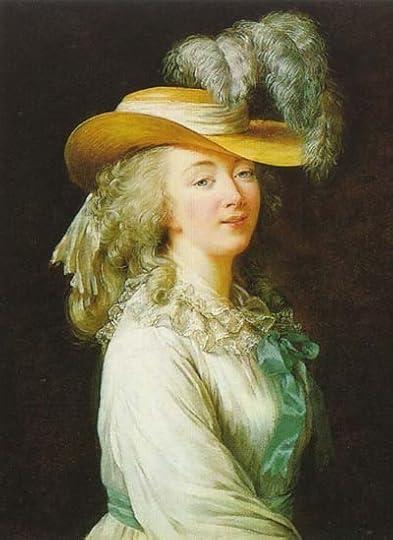
Madame Du Barry
Last mistress of Louis XV (1743-1793)
Jeanne Bécu, known as “Mademoiselle Vabernier”, succeeded Madame de Pompadour as the king’s “favourite” or mistress. He installed her in Versailles in 1769. In spite of the scheming of the duc de Choiseul, Secretary of State, and the contempt of the dauphine Marie-Antoinette, she held on to her position at court until the death of Louis XV. A lover of art, she was a patroness to painters and craftsmen and cultivated the neo-classical style in Versailles.
http://en.chateauversailles.fr/index....
Is it fair to compare the kings' "favorites" to the Belle-époque's cocottes? lol
 The death of la petite phrase!!
The death of la petite phrase!!(well this is my Tabloid headliner. lol)
Quand la petite phrase, avant de disparaître tout à fait, se défit en ses divers éléments, où elle flotta encore un instant éparpillée, ce ne fut pas pour moi, comme pour Swann, une messagère d'Albertine qui disparaissait. Ce n'était pas tout à fait les mêmes associations d'idées chez moi que chez Swann que la petite phrase avait éveillées. J'avais été surtout sensible à l'élaboration, aux essais, aux reprises, au «devenir» d'une phrase qui se faisait durant la sonate comme cet amour s'était fait durant ma vie. Et maintenant, sachant combien chaque jour un élément de plus de mon amour s'en allait, le côté jalousie, puis tel autre, revenant, en somme, peu à peu dans un vague souvenir à la faible amorce du début, c'était mon amour qu'il me semblait, en la petite phrase éparpillée, voir se désagréger devant moi. p220-221
La Petite phrase was love and/or jealousy (hard to tell the difference in Proustian terms sometimes). The Narrator is now letting go of his love/grief for Albertine. Unsurprisingly what interested him most was the dynamic, internal evolution (ie la psychologie dans le temps) of the petite phrase, and not like Swann, the embodiment of their love ("l'air national de leur amour" in Swann's Way, ie the national anthem of their love).
 As Kalliope already noted we get more thoughts articulated from a writer's perspective:
As Kalliope already noted we get more thoughts articulated from a writer's perspective: ... je ne me contentais pas de les voir avec les yeux de la mémoire, ils m'intéressaient, me touchaient comme ces pages purement descriptives au milieu desquelles un artiste, pour les rendre plus complètes, introduit une fiction, tout un roman; et cette nature prenait ainsi le seul charme de mélancolie qui pouvait aller jusqu'à mon coeur. p221
The idea of introducing a fiction, a whole novel, in the middle of purely "descriptive" (theoretical?) pages in order to make them more complete and to "reach the heart" strikes me as ressembling closely (perfectly!) the fabric of La Recherche: long theoretical (dry?) passages followed by lively scenes with the novel's characters...
 The previous passage continues:
The previous passage continues:La raison de ce charme me parut être que j'aimais toujours autant Albertine, tandis que la raison véritable était au contraire que l'oubli continuait à faire en moi de tels progrès que le souvenir d'Albertine ne m'était plus cruel, c'est-à-dire avait changé; mais nous avons beau voir clair dans nos impressions, comme je crus alors voir clair dans la raison de ma mélancolie, nous ne savons pas remonter jusqu'à leur signification plus éloignée. Comme ces malaises dont le médecin écoute son malade lui raconter l'histoire et à l'aide desquels il remonte à une cause plus profonde, ignorée du patient, de même nos impressions, nos idées, n'ont qu'une valeur de symptômes. p221-222
Maybe Proust had a téléphonage with Sigmund?
 Thank the gods of literature! The Narrator is now in fevered pursuit of a blonde jeune fille, who at first doesn't appeal to him much but as soon as he figures it's
Thank the gods of literature! The Narrator is now in fevered pursuit of a blonde jeune fille, who at first doesn't appeal to him much but as soon as he figures it's "...la jeune fille d'excellente famille et apparentée vaguement aux Guermantes dont Robert m'avait parlé pour l'avoir rencontrée dans une maison de passe et avec laquelle il avait eu des relations. p224
(isn't he slightly obsessed with that bit of unlikely gossip?), she becomes "blonde et sournoise" and he becomes "amoureux fou" d'elle.
Priceless end of the scene with Saint-Loup's telegram. :D
The interesting bit is:
Dans ce cas s'évanouissait l'être à l'existence duquel je croyais, que j'aimais déjà, que je ne songeais plus qu'à posséder, cette blonde et sournoise Mlle d'Éporcheville que la fatale réponse allait alors dissocier en deux éléments distincts, que j'avais arbitrairement unis à la façon d'un romancier qui fond ensemble divers éléments empruntés à la réalité pour créer un personnage imaginaire, et qui, pris chacun à part--le nom ne corroborant pas l'intention du regard--perdaient toute signification. p225
Pretty much how Proust constructed his characters. Except it was probably not arbitrarily in the least.
 Kalliope wrote: "The Narrator begins to make references to his novel... (this is getting so exciting...!!)
Kalliope wrote: "The Narrator begins to make references to his novel... (this is getting so exciting...!!)This is when he is about to send a telegram to Saint-Loup to try and find out more about the "Mlle d'Epor..."
I think that sentence refers to the whole story he is already imagining with Mlle d'Eporcheville, not yet his novel (I get the impression "il se fait un film" see Wiktionary). But he is definitely turning his mind towards writing now that he is over Albertine. Which I agree with you is exciting! :)
 Yay!! Some Françoise!Love!!
Yay!! Some Françoise!Love!!... en allant vers la porte pour sortir elle avait rencontré Françoise qui entrait chez moi, la dépêche à la main. Dès qu'elle me l'eut donnée, ma mère avait forcé Françoise à rebrousser chemin et l'avait entraînée dehors, effarouchée, offensée et surprise. Car Françoise considérait que sa charge comportait le privilège de pénétrer à toute heure dans ma chambre et d'y rester s'il lui plaisait. Mais déjà, sur son visage, l'étonnement et la colère avaient disparu sous le sourire noirâtre et gluant d'une pitié transcendante et d'une ironie philosophique, liqueur visqueuse que sécrétait, pour guérir sa blessure, son amour-propre lésé. Pour ne pas se sentir méprisée, elle nous méprisait. Aussi bien pensait-elle que nous étions des maîtres, c'est-à-dire des êtres capricieux, qui ne brillent pas par l'intelligence et qui trouvent leur plaisir à imposer par la peur à des personnes spirituelles, à des domestiques, pour bien montrer qu'ils sont les maîtres, des devoirs absurdes, comme de faire bouillir l'eau en temps d'épidémie, de balayer ma chambre avec un linge mouillé; et d'en sortir au moment où on avait justement l'intention d'y rester. p228
<3 <3 <3
 Book Portrait wrote: "La Petite phrase was love and/or jealousy..."
Book Portrait wrote: "La Petite phrase was love and/or jealousy..."I've been thinking about la petite phrase a lot lately (isn't the Recherche just so full of thought-provoking material?) and as I listen to music, I find myself isolating musical phrases and noting how they are repeated and how they evolve and change. One piece I love, Beethoven's Kreutzer Sonata, lends itself to that kind of close attention and if there ever was a piece of music that encapsulated love and jealousy, the Kreutzer is it. I came across it a couple of years ago while reading Sofia Tolstoy's diaries in which she spoke of her distress at the obsessive and incomprehensible jealousy her husband displayed over her platonic friendship with a musician - they used to play sonatas together for hours. Tolstoy went on to write his novella, The Kreutzer Sonata
 , about obsessive jealousy soon after. The novella is an example of those narratives Proust refers to in which the narrator meets someone who in turn narrates a story about a third character as in Stendhall's La Chatreuse de Parme which our Narrator mentions in this week's reading. I wonder if Proust ever read Tolstoy's novella or perhaps listened to Beethoven's sonata. Here is the sonata with Anne-Sophie Mutter on violin:
, about obsessive jealousy soon after. The novella is an example of those narratives Proust refers to in which the narrator meets someone who in turn narrates a story about a third character as in Stendhall's La Chatreuse de Parme which our Narrator mentions in this week's reading. I wonder if Proust ever read Tolstoy's novella or perhaps listened to Beethoven's sonata. Here is the sonata with Anne-Sophie Mutter on violin:http://m.youtube.com/watch?v=COGcCBJA...
 I have been way too chatty (sorry!) so I'll just post pictures to illustrate "le miracle de la multiplication de la pensée" (lol) of the Narrator:
I have been way too chatty (sorry!) so I'll just post pictures to illustrate "le miracle de la multiplication de la pensée" (lol) of the Narrator: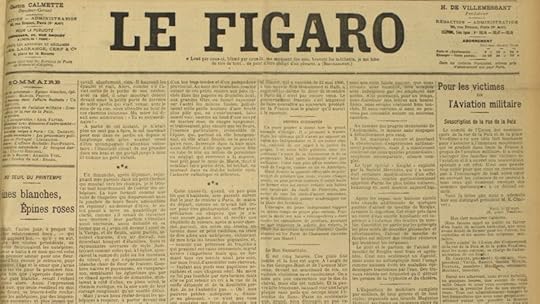
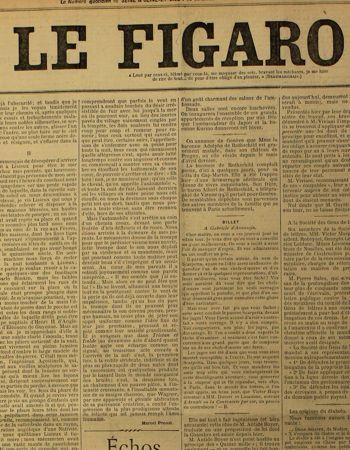
http://www.lefigaro.fr/livres/2013/10...
And just for the pleasure of it:
Mais beaucoup de ceux qui aperçoivent le premier article et même qui le lisent ne regardent pas la signature; moi-même je serais bien incapable de dire de qui était le premier article de la veille. Et je me promets maintenant de les lire toujours et le nom de leur auteur, mais comme un amant jaloux qui ne trompe pas sa maîtresse pour croire à sa fidélité, je songe tristement que mon attention future ne forcera pas en retour celle des autres. p230
:D
 @Msrcelita My mother went to theexhibition in Norfolk of the paintings sold to Catherine the Great and enthused. Amazed to link her trip there from Nottingham to my own YORP!
@Msrcelita My mother went to theexhibition in Norfolk of the paintings sold to Catherine the Great and enthused. Amazed to link her trip there from Nottingham to my own YORP!
 Il n'y a pas une idée qui ne porte en elle sa réfutation possible, un mot, le mot contraire.
Il n'y a pas une idée qui ne porte en elle sa réfutation possible, un mot, le mot contraire.There is no idea that does not carry in itself a possible refutation, no word that does not imply its opposite.
This is Derrida.
 @Fionnuala, I understand your desire to underline; I too highlight so many sentences and passages that it becomes pointless!
@Fionnuala, I understand your desire to underline; I too highlight so many sentences and passages that it becomes pointless!Thank you for the Kreuzer sonata; I was not familiar with it.
@Book portrait, don't apologize for being too chatty. Your comments are very enlightening and I love your historical references too.
@Phillida. I had understood 'la vie réelle est mentale' more as the real life is the interior life,an analysis of what we have absorbed, pondered, digested, and that would encompass everything we have seen, touched, experienced.
 Kalliope wrote: "On Mme de Boigne,
Kalliope wrote: "On Mme de Boigne,Ainsi, Sainte-Beuve, le lundi, pouvait se représenter Mme de Boigne dans son lit à hautes colonnes lisant son article du Constitutionnel, appréciant telle jolie phrase dans laque...
"In the footnote it says that her Mémoires began appearing from 1907 and that Proust wrote about them in Le Figaro on the 20th March 1907 in a long article Journées de lecture (I have to check whether I have it in Ecrits Sur L'Art). "
Maybe this??
http://www.yorktaylors.free-online.co...
 Kalliope wrote: "Marcelita wrote: "Cézanne and Proust....."
Kalliope wrote: "Marcelita wrote: "Cézanne and Proust....."Does anybody know where this preface to the book on Blanche can be found?.. I should check at home in my volume of his Ecrits Sur L'Art, to see if they..."
How about this?
https://archive.org/stream/proposdepe...
 Eugene wrote: "...a vaster system in which souls move in time as bodies move in space.
Eugene wrote: "...a vaster system in which souls move in time as bodies move in space.As there is a geometry in space, so there is a psychology in time... ML p. 751
"...souls move in time..."
Oh, Eugene, these four words...a philosophical favorite.
 Book Portrait wrote: "The word "téléphonage" again! C'est un mot qui fleure bon le passé. :) So much so that it's no longer in my (old) Petit Robert!
Book Portrait wrote: "The word "téléphonage" again! C'est un mot qui fleure bon le passé. :) So much so that it's no longer in my (old) Petit Robert!"But if I recall the Trocadéro scene correctly, it was simply a "phone call". I wonder what the English translation says."
"... in the minor, in a melancholy key, of the same motif that had filled that earlier day, the very absence of Françoise's telephone message, of Albertine's return, which was not something negative."
 Fionnuala wrote: "Book Portrait wrote: "La Petite phrase was love and/or jealousy..."
Fionnuala wrote: "Book Portrait wrote: "La Petite phrase was love and/or jealousy..."I've been thinking about la petite phrase a lot lately (isn't the Recherche just so full of thought-provoking material?) ..."
Jealousy from Catherine Millet...
"The book was reviewed by Edmund White as 'the most explicit book about sex ever written by a woman.'"
http://frenchculture.org/books/author...
Video from last week's "Proust, Love and Jealousy!"
http://www.thegreenespace.org/story/-...
 Book Portrait wrote: "Well I lied. Here's another comment from me. :p
Book Portrait wrote: "Well I lied. Here's another comment from me. :pTo those who visited Cabourg this summer, were you able to visit Proust's room? It was occupied when I was there so we couldn't look at it. This is ..."
Enjoyed Marc's blog-tour.
Some of these have been seen before, but we can never have too much "Balbec."
Kalliope visited 414 and so did....
Jocelyne's "In Proust's Footsteps"
"J'ai plus de souvenirs que si j'avais mille ans", as Baudelaire said, I have more memories than if I were a thousand years old, but here are a few.
https://www.youtube.com/watch?v=9JVhZ...
Who has been sleeping in Proust's Room 414?
http://www.nicolasdrogoul.com/cabourg
A favorite...and posted somewhere else previously.
Larry Bensky's tour of Proust's "Room 414."
@3:25
http://www.radioproust.org/multimedia...
The room in this PR video looked exactly like mine...Room 217.
http://www.youtube.com/watch?v=HitzMk...
 Eugene wrote: "Il n'y a pas une idée qui ne porte en elle sa réfutation possible, un mot, le mot contraire.
Eugene wrote: "Il n'y a pas une idée qui ne porte en elle sa réfutation possible, un mot, le mot contraire.There is no idea that does not carry in itself a possible refutation, no word that does not imply its o..."
I haven't found this line in this week's section. Maybe it's in next week's? In any case this is a highly quotable Proust bit! :)
Between Readers' response theory and Derrida (not to mention the research done in neurosciences on memory, emotions, thoughts, perceptions, etc), it seems Proust was well ahead of his time. No wonder he continues to fascinate us today...
 Fionnuala wrote: "I've been thinking about la petite phrase a lot lately (isn't the Recherche just so full of thought-provoking material?) and as ..."
Fionnuala wrote: "I've been thinking about la petite phrase a lot lately (isn't the Recherche just so full of thought-provoking material?) and as ..."Not having much knowledge of music beyond the basics, I really enjoy all the links posted in the group! A couple of years ago they aired a radio programme on "Proust et la musique" on France Inter (I posted the link in the francophone thread) which you might enjoy.
Je ne cours pas après les livres sur la jalousie en général (I found Othello or Un Amour de Swann suffocating, proof that they were so brilliant but it's like being trapped in madness...>_<) but you got me interested in Tolstoy's novella! Evil temptress. :D
 Marcelita wrote: "Book Portrait wrote: "Well I lied. Here's another comment from me. :p
Marcelita wrote: "Book Portrait wrote: "Well I lied. Here's another comment from me. :pTo those who visited Cabourg this summer, were you able to visit Proust's room? It was occupied when I was there so we couldn'..."
Thankyouthankyou Marcelita for all the treasures you share! :)
The translation of "téléphonage" in English lacks the scent of sepia-colored olden times but even Céleste had to explain the word in her biography. :)
Room 414 is gorgeous (nice video Jocelyne!). It's wonderful that they preserved it. We could only look at a slide show at the reception desk that briefly showed a black & white photo of Proust's room.
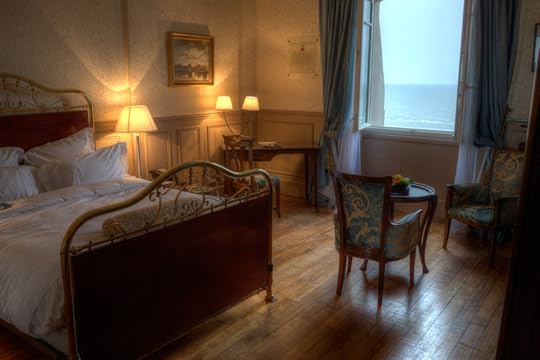
http://a3.4ormat.com/vfs/25402/thumbs...
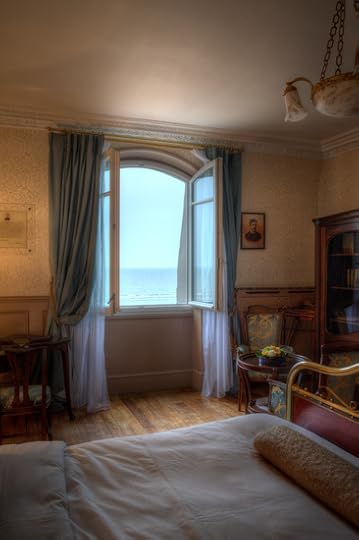
http://a1.4ormat.com/vfs/25402/thumbs...
Of course we'd have to imagine the room with the curtains closed and thick with fumigation smoke. Not quite as relaxing as on the photos! ;)
Was anyone able to visit Proust's 102, Bld Haussmann apartment? I hear it was restored by the bank that acquired the building but they let visitors in by appointment only...
 We just stood outside the Hausmann building and tried to imagine it!
We just stood outside the Hausmann building and tried to imagine it!Re the Tolstoy novella about jealousy, Book Portrait, I'm not recommending it - it was the music that inspired it which better caught the theme of passionate love/passionate jealousy in my opinion. The novella is one of Tolstoy's later works - his wife was a lot younger than he was - and by then, he had become very fundamentalist as regards religion and very fanatical with regard to political ideals. So, for me, the tone of the novella was nothing like the open, tolerant, objective and wise tone of his earlier and more famous works.
Books mentioned in this topic
La Jalousie (other topics)The Nature of Things (other topics)
The Kreutzer Sonata (other topics)
Proust Between Two Centuries (other topics)
Monsieur Proust (other topics)
More...


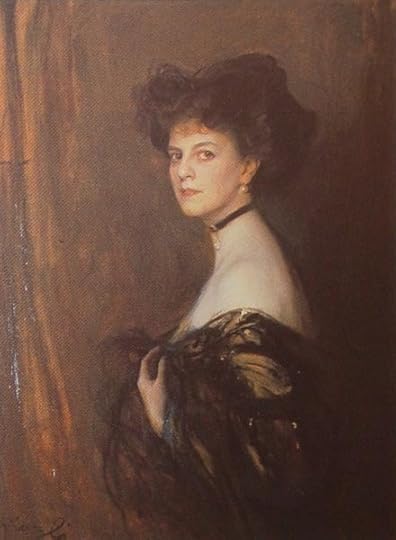


"Si j'apercevais une carte de France mes yeux effrayés s'arrangeaient à ne pas rencontrer la Touraine pour que je ne fusse pas jaloux, et, pour que je ne fusse pas malheureux, la Normandie où étaient marqués au moins Balbec et Doncières, entre lesquels je situais tous ces chemins que nous avions couverts tant de fois ensemble. Au milieu d'autres noms de villes ou de villages de France, noms qui n'étaient que visibles ou audibles, le nom de Tours, par exemple, semblait composé différemment, non plus d'images immatérielles, mais de substances vénéneuses qui agissaient de façon immédiate sur mon coeur dont elles accéléraient et rendaient douloureux les battements. Et si cette force s'étendait jusqu'à certains noms, devenus par elle si différents des autres, comment en restant plus près de moi, en me bornant à Albertine elle-même, pouvais-je m'étonner, qu'émanant d'une fille probablement pareille à toute autre, cette force irrésistible sur moi, et pour la production de laquelle n'importe quelle autre femme eût pu servir, eût été le résultat d'un enchevêtrement et de la mise en contact de rêves, de désirs, d'habitudes, de tendresses, avec l'interférence requise de souffrances et de plaisirs alternés? Et cela continuait après sa mort, la mémoire suffisant à entretenir la vie réelle, qui est mentale."
The power of names is now in his flesh, not just his mind.
Proust's break-down of love gives the following recipe:
love = dreams + desires + habits + tenderness + pain & pleasure
Stir and let stew with memory.
:D
"La vie réelle est mentale" (real life is mental). This not only speaks of a philosophical view of what we call "reality" but maybe also of Proust spending the last 10 (?) years writing his novel in his bed.